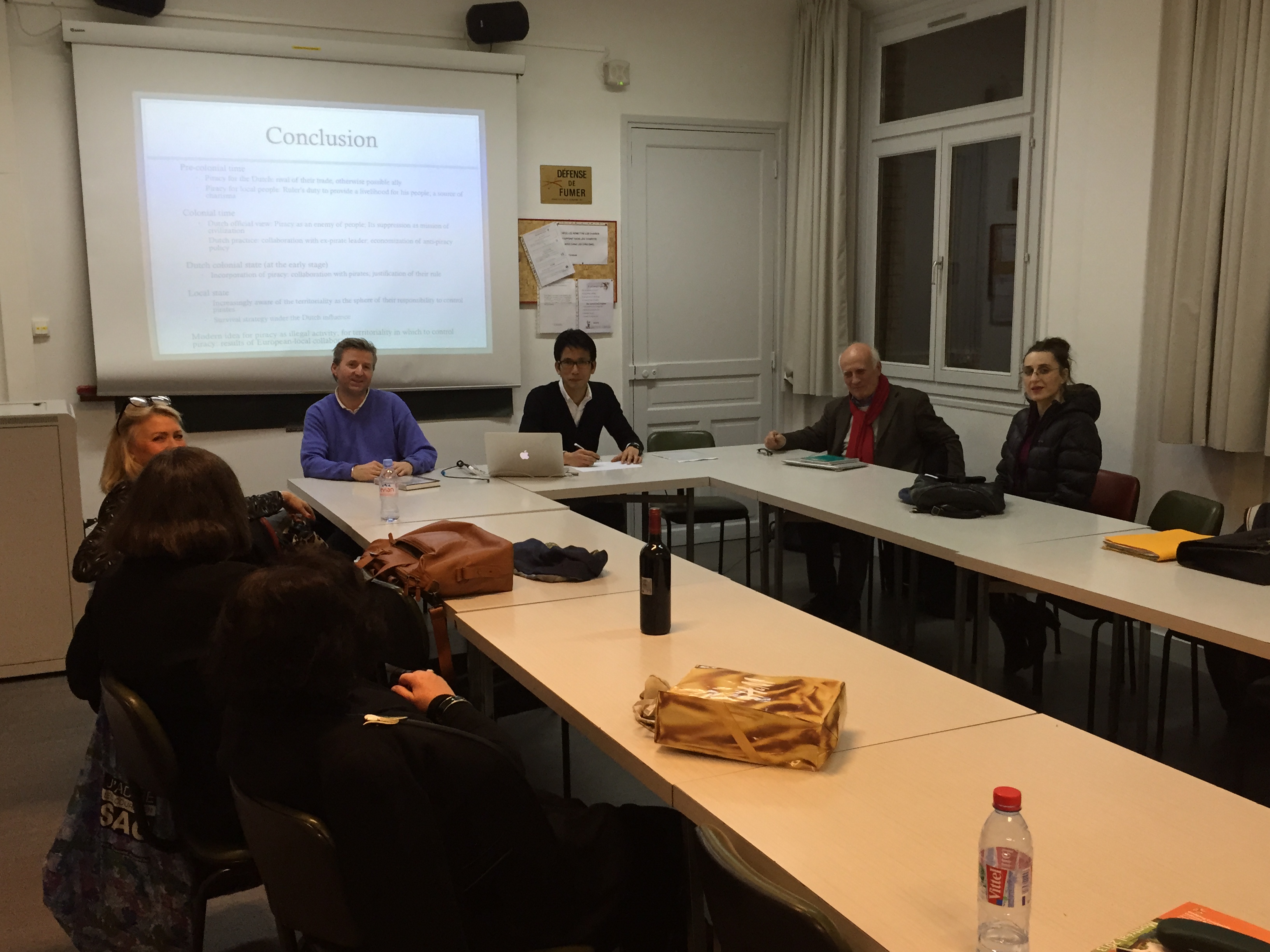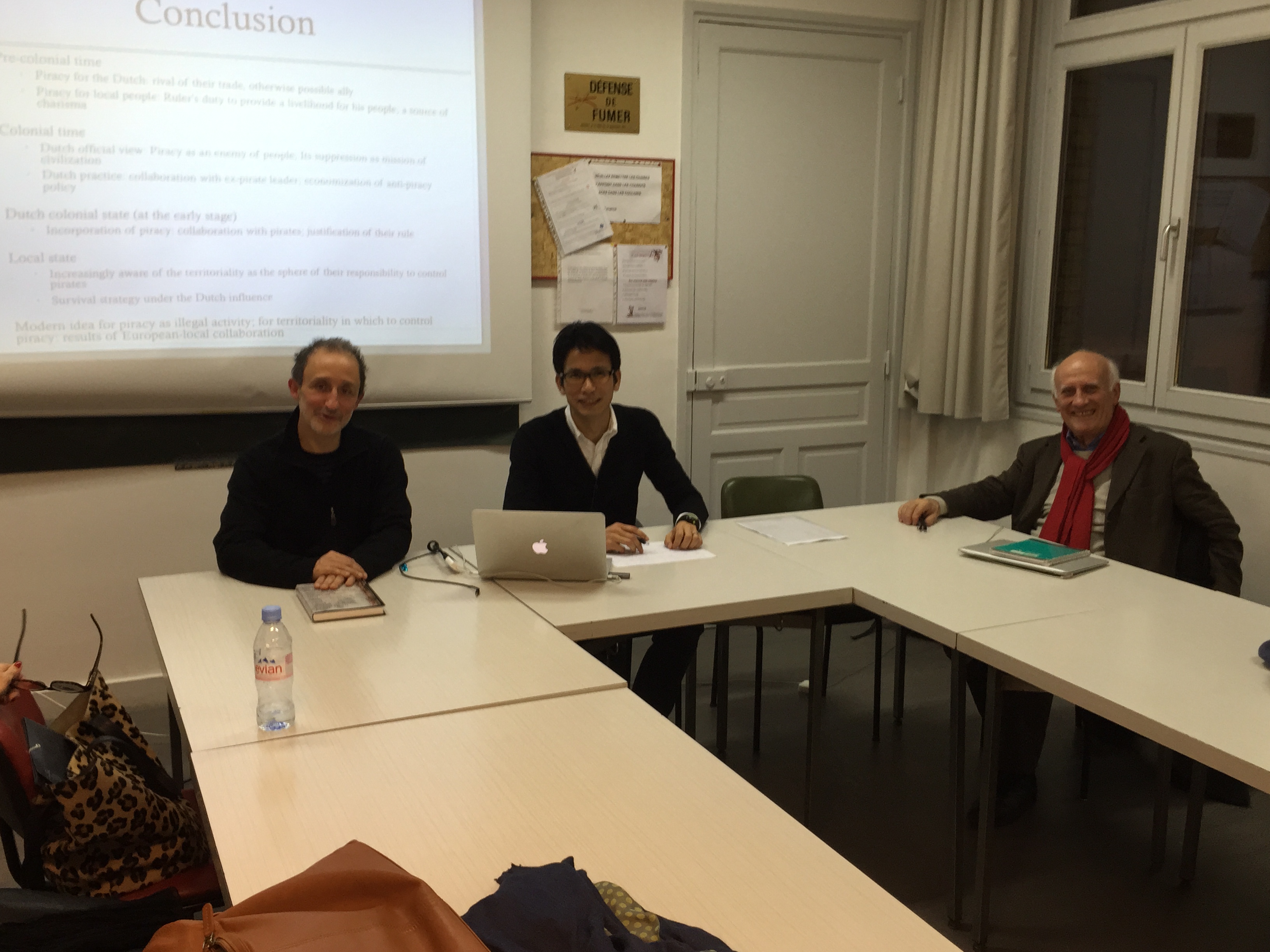2015.02.09
EHESS セミナー Seminar at EHESS
2015 年2月9日、EHESS(フランス社会科学高等研究院)が主宰するcritique de l'economie historiqueと呼ばれる定例セミナー(ほぼ2週に1度開催)で、本プロジェクトのメンバーである太田淳(広島大学)が以下の報告を行った。 EHESS内外の経済史研究者が10数名参加して、活発な議論が行われた。
Atsushi Ota, “Piracy and Modernity in the Indian Ocean World: New Ideas on State and Sovereignty”
太田は冒頭で現在執筆・編集中の論文集 Piracy in the Nineteenth-century World(仮) の構想を説明した後、1800年前後のマレー海域における海賊の頻発と、海賊鎮圧活動から見られる新たな国家観の出現について検討した。具体的には、ま ず、マレー国家内の権力争いにおいて暴力と貿易が頻繁に利用されることが、マレー世界における海賊の重要な要因であることを指摘した。さらに、オランダ東 インド会社、現地人有力者、イギリス人商人などの異なる海賊観を比較した後、植民地支配の確立とともにヨーロッパ人政治権力者だけでなく現地国家の支配者 の海賊観も変容することを説明し、海賊鎮圧活動を通じて海上の国境や領域の概念が次第に明確化することを論じた。
これに対してフロアからは、海賊と対比できる私掠の存在がマレー海域にも存在したか、船舶や武器の技術の進歩が海賊活動に影響したか、同じ商業=軍事集団と してオランダ東インド会社とアジア人海賊との間に類似が見られるのか、などの質問が出された。太田はこれに対し、以下のような回答をした。ヨーロッパにお いて私掠の活動を正当化した国家の地位はマレー世界ではそれほど絶対的ではなく、異なる正統性を主張する複数の権力者に海賊集団が二重の忠誠を誓うことも あった。船舶の技術では帆船に多くのオールを取り付けたアジア人海賊の方が優位であったが、銃砲などの武器ではヨーロッパの技術が大きく上回った。しかし アジア人海賊もイギリス私商人などを通じて武器を入手したことが、18世紀末からの海賊の活発化と関係している。オランダ東インド会社は基本的に自らの商 業上のライバルを海賊と呼んだが、この習慣はマレー世界の伝統とよく似ている。植民地支配の開始とともにオランダは海賊を万人の敵と見なして自らの支配を 正統化したが、これを見て現地支配者も海賊鎮圧活動を始めた点にも類似性が認められる。フロアからはこれに対し、ヨーロッパでも必ずしも特定の国家だけが 正統性を独占できた訳ではないこと、地中海における海賊や海賊鎮圧活動にもマレー世界と多くの類似が見られることが指摘された。
フェ ルナン・ブローデルが始めた由緒あるこのセミナーには、今もヨーロッパ史を専門としながら世界各地の歴史に関心を持つ研究者が多く集まり、比較の視点から の議論が活発であった。また全3時間のセミナーのうち、最後の1時間では美味しいワイン、チーズ、ハムとパンが振る舞われ、さらに意見交換が進んだ。多く の点で学ぶところの多いセミナーであった。
(文責:太田淳)
On February 9, 2015, Atsushi Ota (Hiroshima University), who is a member of this project (GHC), gave the following report at the regular seminar titled “critique de l’economie historique” (held approximately once every two weeks) hosted by the EHESS (École des hautes études en sciences sociales). The seminar was attended by a dozen or so scholars of economic history from within and outside the EHESS and featured lively discussion.
OTA Atsushi, “Piracy and Modernity in the Indian Ocean World: New Ideas on State and Sovereignty”
After first explaining the concept behind the collection of papers he is currently writing and editing titled Piracy in the Nineteenth-century World (tentative title), Atsushi Ota examined the emergence of a new sense of statehood as seen through the frequent occurrence of piracy and efforts to suppress piracy in the Malay waters around the turn of the 18th century (i.e. around 1800). Specifically, he first pointed out that the frequent use of violence and trade in the power struggle on the Malay Peninsula and neighboring areas was an important underlying cause of piracy in the Malay world. Next, after comparing the differing views on piracy among the Dutch East India Company, local influential persons, and British merchants, he explained that the views on piracy of both the European political authorities and national leaders in local regions changed along with the establishment of colonial rule and further described how the concepts of maritime national boundary and territory were progressively clarified through the efforts to suppress piracy.
Various questions were raised by the audience regarding the existence (or lack) of privateers as well as pirates in the Malay waters, the influence (or lack) of technological advances in ships and weaponry on the activities of the pirates, and whether or not similarities could be seen between the Dutch East India Company and the Asian pirates as military groups engaged in business activities. To these questions, Ota provide the following responses. In the Malay world, the position of the state was not as absolute as that of European states, which justified the activities of privateers. There were cases in which pirate groups swore oaths of allegiance to more than one powerful individual, each with different claims to legitimacy. Although the Asian pirate sailing ships furnished with numerous oars were superior in terms of ship technology, European ships were far superior in terms of firearms and other weaponry. However, the increased activity of pirates at the end of the 18th century was related to the fact that the Asian pirates were able to get their hands on weapons through private British merchants. The Dutch East India Company basically called their rivals in terms of commerce “pirates,” which was similar to the customary practice in the Malay world. With the start of colonial rule, the Dutch justified their rule by designating the pirates as enemies. Similarities can be seen between this and the actions of the local leaders who, observing this change, began activities to suppress piracy. It was pointed out by members of the audience that, even in Europe, it was not only certain states that were able to monopolize claims to legitimacy and that numerous similarities could be seen between piracy and the efforts to suppress piracy in the Malay world and in the Mediterranean.
This time-honored seminar started by Fernand Braudel continues to be an event where many researchers who not only specialize in European history but who also have an interest in history around the world meet and engage in lively discussion from the standpoint of comparison. In the last hour of the three-hour seminar, wine, cheese, ham, and bread were provided, leading to further exchange of opinions and ideas. It was a seminar that provided many opportunities to learn about many different things.
(Atsuhi OTA)













